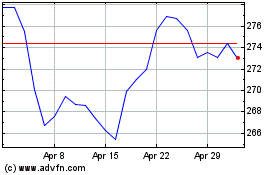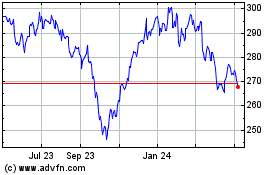SEC Gives Extra Time to File Reports as Firms Assess Coronavirus Impact
March 27 2020 - 8:29AM
Dow Jones News
By Paul Kiernan, Mark Maurer and Dave Michaels
WASHINGTON--Public companies will have extra time to file annual
reports and other major disclosures, as firms ranging from
McDonald's Corp. to Hershey Co. brace for a financial hit from the
new coronavirus.
The Securities and Exchange Commission has given companies an
additional 45 days to file the periodic reports that investors
depend on to learn about financial performance and developing
risks. The relief applies to filings that companies would normally
make between March 1 and July 1.
The situation isn't ideal for investors. Delays in financial
reporting deprive them of the information they need to assess
future performance, promoting higher capital costs, lower stock
prices and more volatility.
"A delay always raises a question: What are they not telling us,
and why?" said Paul Miller, a professor emeritus of accounting at
the University of Colorado at Colorado Springs. "The market's
aggregate will respond with uncertainty by depressing share
prices."
The SEC's measures reflect a growing recognition among policy
makers and investors that it could take months to determine the
economic impact of the pandemic and of efforts to contain it.
Surveys this week showed record declines in U.S. and European
business activity in March, and some data suggest that many smaller
companies--particularly restaurants and retailers--would struggle
to survive a shutdown lasting longer than a few weeks.
"As we cannot predict the duration or scope of the Covid-19
pandemic, the negative financial impact to our results cannot be
reasonably estimated, but could be material," McDonald's said in a
filing Wednesday.
With a growing number of businesses shuttered to contain the
virus, it may be impossible for many companies to assess accurately
the value of inventory, goodwill, accounts receivable or securities
held.
"If all of a sudden most of your primary customers are looking
at potential bankruptcy, you've got to make massive write-downs in
your accounts receivable," said J.W. Verret, a law professor at
George Mason University. "Accountants are facing an impossible task
right now."
For companies such as the health-care logistics firm Owens &
Minor Inc., the task of preparing financial statements for the
latest quarter has so far taken a back seat to the finance team's
analysis of business divisions affected by the pandemic.
"We've probably been more focused on customer-facing decisions
at this point, and not as focused on our Q1 reporting of the
numbers," Chief Financial Officer Andy Long said in an interview.
"It's something that, quite frankly, we're going to spend a little
bit more time on going forward."
The latest round of SEC relief is similar to what regulators
provided companies in areas affected by Hurricane Katrina in 2005
and superstorm Sandy in 2012, though much broader in geographic
scope.
The SEC doesn't give companies free rein to withhold material
information, however.
The agency issued guidance this week on how companies should
update investors on business disruptions from the coronavirus,
including whether work-from-home requirements might hurt their
operations and accounting systems.
Some decisions may be trickier than usual, such as whether to
book an impairment on assets that are less valuable owing to
economic shock. Still, that information should be given to
shareholders as quickly as possible, the SEC said.
"The commission is not going to second-guess business people who
make disclosures in good faith, but they also make clear that if
you knowingly or recklessly make misstatements, that will trigger
enforcement," said Dick Walker, a partner at King & Spalding
LLP and a former SEC enforcement director.
Regulators have also noted the heightened chance of insider
trading in the age of the coronavirus. Managers may have inside
information about risks or business impacts stemming from the
pandemic and should refrain from trading, the SEC's enforcement
division said this week.
The SEC extended similar relief to some filings required of
investment advisers and mutual funds if their operations have been
affected by the pandemic.
Write to Paul Kiernan at paul.kiernan@wsj.com, Mark Maurer at
mark.maurer@wsj.com and Dave Michaels at dave.michaels@wsj.com
(END) Dow Jones Newswires
March 27, 2020 08:14 ET (12:14 GMT)
Copyright (c) 2020 Dow Jones & Company, Inc.
McDonalds (NYSE:MCD)
Historical Stock Chart
From Mar 2024 to Apr 2024

McDonalds (NYSE:MCD)
Historical Stock Chart
From Apr 2023 to Apr 2024
